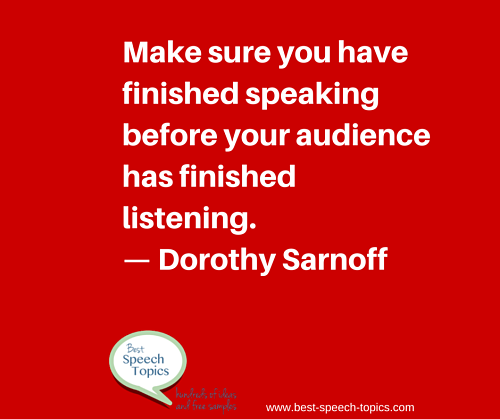Effective Speech Writing

Being concise is the secret to effective speech writing - saying the most in the fewest words.
If I asked you to write a list of memorable speeches, the chances are that the Gettysburg Address would appear on that list. So it's remarkable to consider that that speech is less than 300 words (272 to be precise!).
In 272 words, Lincoln conveyed sorrow, respect, patriotism, determination, and hope, an outstanding feat, and one that few of us could achieve without practice!
We can take a valuable lesson from the Gettysburg Address concerning effective speech writing. Conciseness matters.
Effective speech writing means staying on message. Unnecessary 'waffle' in a speech not only bores your listeners, but it can also confuse your audience. Aside from its historical context, Lincoln's speech was so memorable because it remained tightly focused.
To deliver a message that makes an impact, you need to make sure that your speech uses the fewest words possible, and that each word supports your overall theme.
Effective Speech Writing - How to Keep Your Presentation Concise (and your audience interested!)
Use everyday language that's easy to understand
Compare these - which do YOU think is better?
- "The purpose of my presentation here today is to ponder the wisdom of permitting casual attire in our workplace, rather than the high standard of dress currently expected."
- vs -
- "Today I'd like to talk about the campaign to change the office dress code."
The two sentences are stating the same topic - one uses 28 words, the other only 14!
Keep your sentences short
Once you've written your speech, go back through it and look for lo-o-ng sentences that could easily be divided into two (or more!).
- "The current climate is one of uncertainty, with more and more people out of work because of the closure of the largest factory in the area."
- vs -
- "The current climate is one of uncertainty. More and more people are out of work because of the closure of the largest factory in the area."
See how the second example has more impact than the first? Effective speech writing prefers simplified sentence structure that is more direct.
Shorten your phrases
We overuse long phrases so often that we do not even realize it! In our desire to explain thoroughly and eloquently, we overextend our wording.
For example:
- "In a situation in which the front door is locked, you may enter via the side gate."
Could be:
- "When the front door is locked, enter via the side gate."
Another example:
- "In light of the fact that our guests were disappointed by the lack of choice, we have changed the menu."
Could be:
- "Because our guests were disappointed by few choices, we changed the menu."
And another example:
- "It is necessary for us to all abide by the rules."
Could be:
- "All must abide by the rules."
Keep on topic!
The tendency to 'stray' comes when we deviate from the subject at hand to tackle related information. Effective speech writing requires that using an outline to stay on target. Imagine an archery target. Does each idea in the speech hit the bullseye of the thesis statement? If not, save the idea for another time.
When editing written work, check that every paragraph relates to the central message of your speech.
Avoid the passive voice
Writing in the passive voice tends to make sentences more protracted, more confusing, and dramatically reduces their impact.
Not sure what this means?
With the passive voice, the subject of a sentence becomes the object (or is missing altogether).
For example:
- The artist displayed his painting. (Active)
- The painting was displayed by the artist. (Passive)
The active sentence has five words - the passive has seven! Moreover, the overall message is explicit in the active voice.
If you struggle to identify the passive voice in your work, then I recommend the Hemingway App (it's free online!). Hemingway was famed for his simple, unadorned use of words and the app will help you adopt this style in your writing. Grammarly is another modern writing assistant with more plug-in options than Hemingway for Chrome, Safari, Firefox, Edge, and now Google Docs. Some reviews of these grammar tools will point out that none of these tools are perfect. That said, Grammarly is an invaluable to the author of this article for limiting unintended use of passive voice. See my 2018 review of Grammarly.
Use visual aids
There is much truth in the old idiom 'a picture is worth a thousand words.' Pie charts and diagrams can help you present a considerable amount of information in a very easy-to-understand way — data and facts that might otherwise be boring.
Avoid being TOO brief...
It is critical that your speech includes all the key points. Covering the material with proper depth is why I recommend that you DO NOT worry about being concise in your initial draft - instead, write freely, then edit your words. That way, you will see that all the main points are covered and focus on pairing away the unnecessary words and details.
If there are no time constraints or targets for the length of your speech, remember the wise words of the Academy Award-winning actor Sir John Mills -
'Be sincere, be brief, then be seated.'
Free email delivery
MASTER INFORMATIVE SPEAKING WITH OUR FREE CHECKLIST!
We are offering you a FREE SpeakFlight Informative Speaking Preparation Checklist. This valuable resource is packed with step-by-step guidance to help you create compelling, memorable, and effective informative speeches.
Recommended pages:
The Importance of Public Speaking
Writing Tips
How to Come Up with Topic Ideas


